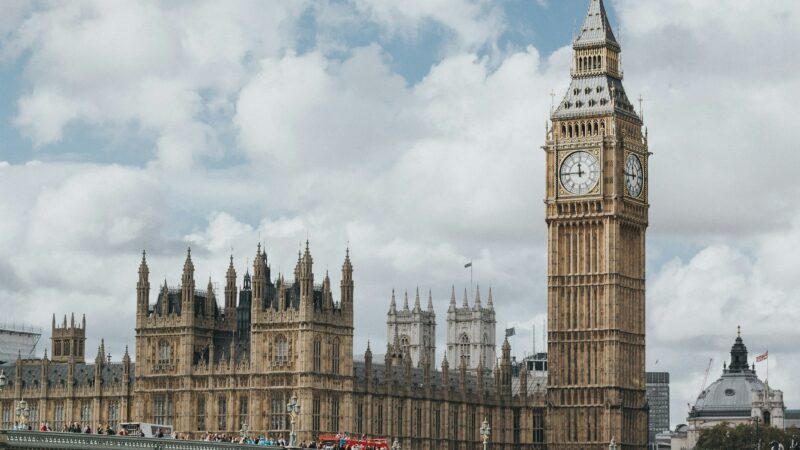For My Ex-Libertarians
The United Kingdom, and especially the Isle of Great Britain, has a very particular legal quirk that sets it apart from Western Civilisation, and possibly most of the uncivilised world as well. There is no legal right to self-defence. Everyone knows that to some extent, “guns are banned” in the UK, and we’re nothing like those silly Americans who can carry so-called assault weapons in Wall-Mart. Yet most Britons will be surprised to learn that non-lethal options such as pepper spray are only available to law enforcement personnel, and that possessing any product “made or adapted to cause a person injury” (aka the most effective way to reasonably defend yourself or those around you) in a public or private space is against the law. Instead the ladies and gentlemen of the UK may purchase a rape whistle, as politely suggested by the West Yorkshire Police on their “Ask The Police” webpage. The UK is so averse to the concept of self-defence that in 2012, American Self Defence instructor, Tim Larkin was barred from entering the country by Theresa May during her stint as Home Secretary.
This is a stark contrast to the continent, where countries like Austria, Germany, and Hungary have strong, codified legal definitions of self-defence with “stand your ground” laws, as well as the option to carry things such as bear spray, and with an easily obtainable permit you can even carry pistols capable of firing rubber bullets or CS gas pellets. In France, similar laws apply, pepper spray, gas pistols capable of firing CN or CS Gas are available to any law-abiding citizen above the age of 18. Whilst carrying them in public for self-defence is not a valid reason, French law stipulates you may use them lawfully to defend your house and person. Of course, there are still problems here. Stéphane Charbonnier, the director of the famous Charlie Hebdo magazine and sports shooting enthusiast applied for a permit to carry a firearm for self-defence, this permit was denied, and he was told he could rely upon his police protection. We all know what happened next.
Following the various terror attacks across France in 2015, the French government permitted all police officers to carry their service firearms whilst off duty. Compare this to the UK, where outside of Northern Ireland, only specialist police are allowed to even think about firearms and have very little support from the government or the courts when they do shoot, despite their enshrined right to kill in service of the state and his Majesty. Imagine if Westminster had decided to arm all British city police services after the Murder of Lee Rigby, or in 2017 after multiple violent terrorist attacks across Britain. Imagine a Britain that allowed off duty police or even current or ex-servicemen the ability to carry a firearm in public for the purposes of self-defence. I digress, the arming of the British Police is another debate for another time.
This all seems rather reasonable and modern, two European democracies with modern, democratic attitudes towards personal self-defence, but that’s not all. Countries like Italy and Spain allow high risk individuals and business owners such as jewellers or cash transit guards to carry firearms on their person, or to be kept in a secure location at their place of work. There are similar laws like this across the less developed nations of Europe, particularly in Eastern Europe and the Balkans. But what’s extremely interesting, is that right in the heartland of Europe, there are two countries that stand alone when it comes to modern European firearms and self-defence law, Austria, and Czechia (formally known as the Czech Republic). Both of these countries permit civilians to own firearms for the express purpose of self-defence, and even allow civilians to carry them (Czechia) or very conditionally (Austria). The majority of all firearms held in Czechia are held for protection, and more than half of all Czech firearm owning citizens have a permit to carry a firearm for self-defence. Austria has some more specific use cases, but the general legal position is that if you own any sort of firearm, or any other kind of legal weapon for that matter, it can be used to lawfully defend yourself or your property. Austrian business owners or employees of said businesses (with express legal permission from the owner of the premises) can carry their firearms within their private premises but carrying prohibited weapons in public is illegal without a lawful reason. I don’t need to attack your brain with graphs, stats, and differential equations to prove to you that modern European nations with clear self-defence laws that empower victims with the ability to neutralise threats quickly and effectively to their person, their personal liberty, and their property are better places to live in than any major British city.
If you cannot effectively defend yourself or your property, how can you be expected to defend your country? In 2013, after Lee Rigby was brutally executed on a busy street in broad daylight, there was a lot of discussion about how people in the background are just carrying on with their own lives, walking past the two-blood-soaked Islamic militants as if public beheadings were just a normal part of life in the Royal Borough of Greenwich. A similar discussion has opened up regarding the recent rape case on the tube, about how other passengers just sat there and let it happen. The general public is aghast and shocked at such cruel indifference. But all official documentation from government and law enforcement officials in the UK recommend non-intervention, that your best choice of action is to merely alert the authorities and wait. And even then, there’s a possibility that even a police officer acting in the course of their duty to protect the general public, can be charged with murder. The current UK legal system requires all violent action towards others to be “proportional force” to be considered lawful self-defence, but how do you calculate what is proportional to a man raping an unconscious woman right in front of you? Surely in this instance you apply the most efficient and effective method you have at hand, regardless of how much damage is done to the assailant?
With the official legal advice of the government and all Law Enforcement in the UK advocating a form of learned helplessness, it’s no wonder that when confronted with difficult and violent situations, many can only watch in horror as they wait for the equally ineffective authorities to arrive and diffuse the situation. Now what happens if you are a young woman, and after calling for assistance you are greeted by Metropolitan Police constable Wayne Couzens? After that incident, the complete indifference to the “Near-Eastern Ceasefire of the week” public disturbances, and the overall lack of an effective police presence across any British Urban centres, what’s the point in calling the police? They won’t arrive on time, and it’s more than likely they’ll have you sleeping in a cell when they finally get there.
My own personal experience of the ineffectiveness and apathy from the British Police Services, was last year, when my mother’s car was stolen from her drive in the early hours of the morning. Already prepared for the Brazilification of the UK, the car was equipped with a tracking device. Being model citizens who know better than to engage in vigilantism, we scoped out the location on google maps and informed our police service that the car had been stolen, but we could also provide the police with the approximate location, aiding with the investigation and bringing about swift justice to car thieves! After all this isn’t South Africa, where you have to bring your own pen to the police station to report a crime. Amidst the excitement, our local police service informed us that since the car was now located in Outer London, the case would have to go through a lengthy transfer process to the Metropolitan Police Service before anything could happen. This process could take hours or days depending on how busy things were, and things are always busy for the Met. This immediately put a damper on the celebrations. Who knew how long it would be before the tracker was found, and the car relocated to a secure location beyond the reach of google street-view…
The deskbound officer heard our dismay and informed us that car theft in the UK currently follows a rather specific modus operandi. Cars are stolen to order by professionals, who then take the cars to out of the way locations, blocking the car from view with vans or other large vehicles, then they leave the cars alone until multiple stolen cars can be transported in bulk to the coast and then shipped off into the unknown. Then the officer told us that we could, as private citizens, retrieve our own property, as long as we believed that it was safe to do so. Yes, you read that correctly, the policeman who took our call, told us to go get our car back by ourselves, and to bring proof of ownership and identification because we would most likely be stopped by the police on our way home as we would be in the possession of an “un-stolen vehicle”. When I heard this I actually belly laughed, it was like being back in South Africa again. Nevertheless, we decided to sally forth.
As South Africans, our natural instinct was to reach for the 9mm for some insurance. Sorry, this is a civilised western nation, you can’t have that anymore. And even if we could, British laws would criminalise us for bringing anything with us for self-defence, and we would potentially receive greater punishment than any of the car thieves if we had anything on us which could be used to harm another person. To cut a long story short, despite assurances from police that someone would be dispatched to make sure we weren’t bleeding out on a dodgy council estate, we retrieved the vehicle with zero assistance from the police. It was located on an estate covered in bits and pieces of various luxury SUVs and Saloons, with masked youths cutting up cars on driveways in broad daylight. If anyone came at us with a knife or blunt instrument, my only effective means of self-defence would’ve been to hit them with my car, certainly a gross violation of “proportional force”.
This is what made me realise that the British Police and the legal system have completely failed the ordinary person. We were explicitly told by the police that if we ever wanted to see the car again, our best course of action would’ve been to retrieve it ourselves, providing that “it was safe to do so.” How is retrieving a stolen vehicle from a council estate safe in any capacity? Is “safe vigilantism” the future of law and order in Britain? The British police outsourcing law and order to the general public is not a recent phenomenon, and there have been many other cases where the police have been dependent upon law-bending civilians to enforce the peace.
Now if we were Sikhs, rather than dreaded White South Africans, we would be well within our rights to carry a blade during this endeavour because the legal system makes an exception for a weapon that has to be carried at all times “for religious purposes”. That religious purpose is explicitly self-defence mind you. Despite the fact that carrying any kind of blade explicitly for self-defence is a gross violation of UK law. Quite famously during the 2011 riots, Sikhs took to the streets with swords, bats, and all manner of weapons to defend their communities, and instead of the police disarming the sword-wielding paramilitary forces and dispersing, the Sikhs were praised by the Prime Minister! If I took even a rounders bat with me to rescue my mother’s stolen car I would’ve gone to jail.
The interesting thing about this Sikh tangent, is that the Seax, the famous historical general-purpose knife of the Anglo-Saxons, was considered to be a status symbol of a freeman, and that anyone without one was possibly a serf or a slave. Could an Anglo-Saxon freeman lawfully carry a culturally and religiously significant object like the Seax in modern Britain?
The 2011 August Riots revealed a long-held apathy within the police and the law enforcement caste of the United Kingdom. Across the country, militias appeared outside of Turkish barber shops and kebab bars. This mass mobilisation was welcomed across the political landscape, with no minister brave enough to question why these businesses and community centres had a surplus of edged weapons and baseball bats conveniently ready for an occasion like this. The EDL came out in force in Enfield and North London, and were reprimanded by the police and political establishment merely for being present. None of them were armed with more than an England football shirt, yet received none of the praise the middle eastern baseball enthusiasts got from the then Prime Minister, David Cameron.
I was going to conclude the article there, but since writing began, three more events have come to attention. On the 30th of December, 2023, roughly 50 men from the London Eritrean community gathered in Camberwell, armed with bats and wooden planks, injuring four officers and disturbing the public good. Apparently only eight individuals were arrested during this act, when you can clearly see countless men violating every British weapon law, as well as assaulting police officers and vehicles with weapons whilst the police seem only capable of timidly backing away. 50 or more Eritreans with cudgels fighting a pitched battle with the police, barely any news coverage, less than a quarter of the perpetrators arrested… Why? What’s the point in even showing up? Let the Eritreans bash up their own embassy if you’re not going to arrest them, it’s probably better they harass their own government rather than vent their frustrations on ordinary Londoners.
The second event was the reveal that Lawrence Morgan, the Jamaican Gangster whose deportation flight was prevented by a jumped-up Cambridge grad who now resides in Norway, was scheduled to be physically removed after a string of violent firearm related incidents. In 2016 Lawrence Morgan was imprisoned for only five years and ten months after being charged with the unlawful possession of a firearm, ammunition, and controlled substances. Another two-year sentence in 2017 for drugs charges, and then in 2020 he is caught on CCTV footage participating in a lethal Birmingham gang shootout whilst riding a small bicycle. No murder or attempted murder charges, despite the battle causing the violent execution of his associate, and Morgan himself caught on CCTV firing a pistol with intent. Jailed again in 2021 for only five years. The authorities attempted to deport Lawrence Morgan in 2023, if they fail to do so again (Border authorities have reportedly hired a hanger to stage deportations since they have become completely incapable of doing their job) Lawrence Morgan will most likely be back on the streets of England in a few years’ time. Ideally Lawrence Morgan would’ve been deported after his first firearms offence, but the only reason the authorities have attempted to deport him now was because in October last year, UK prison governors announced that British prisons were rapidly approaching full capacity. How many failed deportations do they let you have before they grant you citizenship?
And thirdly, a horrific chemical attack was carried out by an Afghan Asylum seeker, one let into the country despite a history of violent and sexual offences. The police now seem incapable of finding him and have publicly lamented that it’s “sooo difficult” to find someone who doesn’t use their bank card or a mobile phone. The forces of the state have no issue when it comes to keeping track of every football fan who has ever gotten a little rowdy at an away match, but a violent sexual predator can disappear into thin air as long as they stay away from their smartphone. As an ordinary citizen, no rape whistle or panic button can defeat a lunatic armed with even a small quantity of a corrosive substance. What can you possibly do when threatened with life changing injuries and or death? The legal precedent of proportional force would suggest that ordinary civilians should disfigure or maim an acid attacker, instead of putting the threat down with a human and instantaneous response.
Idris Elba and other lionised television gangsters such as the Labour party have begun a call for the complete ban of items such as machetes and “zombie knives” aka any large single bladed knife or sword, like the various kebab knives and industrial cutting tools that many people use for work, daily life, and the odd riot prevention. Nevermind the fact you’re more likely to be stabbed to death by a supermarket steak knife or B&Q screwdriver than meet your end facing an authentic katana or antique sabre wielding urban youth. There has been nothing from these public figures about controlling the usage of drain cleaner or any other household substances that can permanently disfigure or kill someone, but tools and items used by ordinary citizens, historians, law abiding collectors, and specialist craftsmen must be taken away because their mere existence corrupts the urban children and encourages them to embrace gang culture. As usual, our politicians would rather punish law abiding citizens instead of actually attempting to tackle why the urban populations of Britain prefer smoking weed and carving each other up instead of going to youth clubs and boxing gyms.
I expect Lawrence Morgan and other violent Jamaican gangsters will be back on our streets on “good behaviour”, in no time, and other local roadmen will be offered shorter and shorter sentences. Violent schizophrenic, with a history of incidents, Valdo Calocane, who stabbed three people to Death in Nottingham is not being charged with murder, but manslaughter. Following this trend, after a few years of medication and observation in a secure hospital he will undoubtedly be released back into the general public, to make room for more aggressive mentally unwell individuals.
We can no longer rely upon nautical building accessories like Narwhal Tusks, and have a sensible European approach to the legal right to defend one’s self, one’s property, those around you, and that which you hold dear. If you look at prior days of infamy, such as the Siege of Sidney Street or the Tottenham Outrage, when doing battle with violent aliens, the forces of law and order were joined by armed civilians giving chase themselves, or equipped and supported by civilians. Conveniently enough, the fact that the police during the Siege of Sidney Street were armed with firearms provided by a local gunsmith is left out by almost all official sources such as the BBC and London Police museum exhibitions.
With the appropriate equipment, perhaps it would be possible to galvanise the British public and restore even a semblance of law and order to Urban Britain. If at least one person had ready access to an incapacitating weapon like pepper spray or even a concealable firearm on London Bridge that day, five people would not have been stabbed. Across all of England’s terror attacks and similarly violent incidents, there are multiple references to bystanders resorting to desperate and weird items to defend themselves with like skateboards, tusks, or ornamental spears from historical displays. Granted pepper spray won’t do very much against a Christmas terror-lorry barrelling towards you but merely knowing in a violent situation you would be capable of doing more than cowering in fear and waiting for the royally appointed death squads might encourage the British population to have more of a spine.










Not With a Bang, But a Whimper
This past week, Tucker Carlson travelled to Moscow, Russia to have a sit-down interview with President Vladimir Putin. Before the almost two hour interview was conducted, Tucker Carlson explained his motives for being in Russia – a now pariah state in the Western mind – as trying to get the “other side” of the story.
After all, it has been almost two years since the greater war in Ukraine began, with the invasion of Russian forces in February of 2021. Yet no media outlet in the West has either sought, or been bothered to get a deeper understanding of the Russian motivation, instead painting the conflict with broad strokes as a Marvel-esque “good guys against bad guys” situation.
Credit where credit is due, Carlson is doing the job that most journalists these days refuse to do – report, and let the audience make up their mind. But what became very apparent from the offset of the interview conducted on the evening of 7th of February was just how unexpectedly out of his element Tucker Carlson appeared to be.
After the now infamous 45-minute long history lesson of Russian-Ukrainian relations going back to the eighth century, Tucker Carlson found himself getting overwhelmed with the offload of (possibly far-too-detailed) background context of the war and its causes.
This, for many, seemed to be shocking revelations.
“We didn’t know a world leader could be so detailed with historical knowledge!”
“He didn’t even need notes, meanwhile our leaders can barely read off of a teleprompter! Shameful!”
But Putin’s narrative and historical tangent shouldn’t come as a surprise, as it is the same reasons he gave in a published essay On the Historical Unity of Russians and Ukrainians which justified his reasons for the invasion and interest in bringing Ukraine (or at the very least, parts of Eastern and Southern Ukraine) into the Russian Federation.
Hardly new, shocking, or insightful – it’s the same point he has been making, very publicly, for the last two years – of course always ignored, filtered, or taken out of context by the Western news media.
When pressed to talk about NATO expansion being a possible provocation of Russia’s actions, Putin, once again, stuck to the same story he has been telling the world for the better part of a decade.
Russia is willing to cooperate with the West, and is even willing to allow an independent Ukrainian state partner with the EU and become more friendly with Western Europe and America, as long as Russia’s strategic and security interests are respected and cooperated with.
This was why for decades prior to the Maidan, Russia had not escalated provocations – beyond a few strongly worded statements – with NATO despite NATO expansion beyond Germany into the Baltics and Balkans.
Our leadership – more specifically – the warhawks and ideologues who make up the body of the US State Department and inner-mechanisms of Washington D.C. body-politic who are heavily benefiting from, and invested in the superfluous military contacts and deals, have had no interest in playing ball – even after the Cold War and the fall of the Communism in the Eastern Bloc.
Putin suggested that it wasn’t that he had poor relations with elected leaders, but rather that any time he had approached NATO, American or European leaders with opportunities for cooperation, it was always received enthusiastically, but then quickly shut-down by the “expert” teams that inform Western elected officials.
Perhaps this is just posturing and expert narrative-building that Putin tells himself to sleep better at night, and wants to manipulate the narrative to better suit his own image as a victim of the Western machine.
But speaking as a Westerner, and as someone who has seen the actions of elected governments of both left and right-leaning factions, has anything our governments done in the last thirty years, especially in the realm of foreign policy, actually benefited the world or made it better?
The Iraq War? We manufactured a false narrative about weapons of mass destruction, and Saddam Hussein working with Al-Qaeda in order to invade. We left millions dead, radicalised millions more to become vehemently anti-West, and left the vacuum for ISIS to grow in the wake of our “victory”.
The deposing of Gaddafi in Libya? We left a nation in ruins, which has now become a hotbed for open-air slave-trading, terrorism – and we now have no buffer state between Africa and the Mediterranean Sea, feeding the immigration problems of the last two decades.
The War in Afghanistan? Not only did we have no real long-term objective being there, we helped fuel the opioid crisis by encouraging, and protecting the cultivation of poppy – which would wind its way into the US through the illegal drug trade, leading millions of Americans to be hooked on literal poison. Not only this, once we left, the government we installed collapsed like a warm Easter egg and the Taliban became a regional power by seizing the weapons the U.S. military had left behind.
The Syrian Civil War? We armed “rebel” groups to topple the Assad regime, leaving a country devastated, millions of people displaced, and causing the refugee crisis in the 2010s.
I could go on and on, these are just a few of the glaring examples – but how has any of our “democracy building” fared? Did we build democracy, or did we just ruin perfectly stable countries because Washington policymakers were so convinced of their own excellence and patting themselves on the back for “safeguarding democracy” that they couldn’t see the looming disasters that would result from their insane actions?
When our reasons for going to war and causing untold levels of devastation have been as vague as “protecting/promoting/building democracy” for every single one of these conflicts, I’m not surprised that when a world leader outlines very different, very detailed reasons as to why he wants to conduct military action – analysts and intellectuals are hardly able to pick up their jaws from the floor.
Despite the fact that this has always been the way the world has always worked, it just goes to show how removed Western governments and foreign policy decision makers have become from reality.
Within a century and a half, we went from the brilliance of Bismark to the nonsensical politicking of Nuland. A truly astounding fall from grace.
Coming back to Ukraine, we had peace-talks and negotiations ready to go in Istanbul, which most likely would have resulted in an end to the bloodshed, and perhaps a North Korea type DMZ along the Dnieper that may not have made either country happy but would’ve at least established a firm red-line that neither party could justifiably cross.
But that was stifled by former Prime Minister Boris Johnson, who I assume was working at the behest of Washington and seeking his own Churchill moment, who instead encouraged Zelensky and the Ukrainian government to “fight on!”.
Almost an entire generation of young Ukrainian men have been wiped out, millions have fled the country as refugees, and it has become a meat-grinding war of attrition – one that the Ukrainians cannot possibly win by their sheer lack of numbers, but instead they will be slowly grinded down into submission, regardless of how many arms and funds are sent by the West.
All of this, because we have been refusing to sit-down, have a little sense of humility in the changing world we live in, and compromise at any level.
We have been force-fed this phoney narrative that Vladimir Putin is this seething maniac, frothing at the mouth rabidly because he needs this war, and he needs to win it otherwise his entire rule is delegitimised, and his iron fist over Russia be brought down – that all we need to do is keep fighting and we will win! The good guys always win, right?
But Putin’s conduct and body-language in the Tucker Carlson interview spoke very differently to the narrative we have been fed.
This is not someone who is on edge about this conflict, nor feeling as if his administration and rule over Russia is under serious threat. His body-language was as if this whole conflict was simply just another day at the office – that he is willing to negotiate to end these hostilities, but if not all he has to do is wait.
And who can blame him for this certain calm confidence that he carries?
At the same time the Carlson interview was being broadcast on X, President Biden held a press conference in the White House to assure the press and general public that his brain hasn’t turned into mashed potatoes – in the same speech he said that President Assisi of Mexico would allow humanitarian aid into Palestine. Reassuring, of course.
While the United States, Great Britain, and the broader Western world are all on-track for domestic disaster – with severe economic inflation, political and social rifts that have turned people against each other and their governments, and self-imposed demographic suicide – why would Putin need to worry at all about what the West does?
All he has to do is wait – and he has the growing world of the East, namely India and China, that will continue to trade and maintain relations with Russia, and not seek to harass or get involved in Russian domestic affairs.
Ukraine is not the “last stand” of the West as it has been made out to be. I think you’ll be hard-pressed to find anyone in the Western world who is actually enthusiastic about the idea of dying in the mud and snow-ridden trenches of Donetsk and Luhansk to defend… foreign democracy? If that even is what we are defending, after all, rival parties have been banned in the Rada.
No. Frankly, the United States is on the path to isolation one way or another. It will likely be because the domestic situation would become so bad that it has no other choice but to focus its efforts inwardly to prevent complete national fracture.
If push really comes to shove, even the warhawks in Washington would rather pull out from escalating into larger hostilities with a nation that can match the United States in terms of nuclear firepower. Having already made their billions of dollars in weapons contracts, what is the benefit of further plunging the world into a war which will surely lead to mass devastation, leaving no possible markets to sell their goods.
And when the United States withdraws much of its interest from Europe, where will that leave the EU?
Without American energy, and without American guarantees of protection, Europe will have to find its own ways of maintaining itself – which will be made all the more difficult since the position of the EU in regard to Russia, and the Russian supply of energy has been to sanction it and stop it, with no real viable alternative.
This will only exacerbate the pre-existing issues in Europe – when quality of life is severely lessened, and basic needs like warm homes in cold winters and steady food supplies are no longer guaranteed, the masses will lash out, first at each other, and eventually at the politicians and governments who led to this disastrous eventuality.
This is what the war has become. An international game of chicken, with one side holding a significant home-turf advantage. Sanctions have not worked, but instead pushed Russia to internally change to become less dependent on trading in US dollars and looking for foreign alternatives.
Funding and arming the Ukrainians has meant that a war that could’ve been over in a matter of weeks and months has now grinded into a war that will last for years, until the front lines simply cannot be maintained by lack of numbers. The humanitarian disaster that could’ve been averted almost a decade ago has left one of the largest countries in Europe devastated, decimated, and tens of millions dead and displaced – not just soldiers, but civilians.
Russia has been pushed further to work with other foreign global competitors like China and India, rather than European neighbours – both nations having some of the largest population centres on Earth. Pax Americana is dead and buried, never to return in our lifetimes – it was killed violently by the very people who were put in charge to maintain it. A sort of twisted ironic suicide.
One of the most important points brought up in the Tucker Carlson interview was Putin’s outlook on the changing world. He has seen the winds of influence and importance change from the West to the East, and he has adapted accordingly.
When discussing the opportunity to bring the conflict to an end via negotiating a peace deal with Ukraine (i.e. the United States) he stated that there were avenues to do so with dignity, that will allow the United States to have the PR victory it so desperately craves to save face from ultimately wasted efforts.
The avenue is there, and if I was one of the embedded decision-makers in Washington I would take a mutually beneficial deal as soon as possible – as the alternative will not be escalation into a hot war, but enduring diminishment of both hard and soft power in the continent, as European states begin to understand that they cannot rely on the United States to have their best interests at heart, or make sound policy decisions on their behalf – which is the ultimate function of NATO.
As T.S. Eliot once wrote:
The world we once knew is coming to an end, this much is overwhelmingly clear.
It is not our current flock of leaders or decision-makers – but rather it is up to us, the next generation of individuals and standard-bearers whether we will adapt to the changing world and rekindle the fire into something that endures, or whether we will let our civilization fade into obscurity and extinguish, never to return.
While we may not have learned anything all that new or groundbreaking from the Tucker Carlson interview with Vladimir Putin, I think it serves a greater purpose than a simple “gotcha” to Western journalism or the current political class.
It is an insight into how the “other side” thinks of us, of our future, and our decline. We ought to wise up, prepare for the long, difficult road ahead, and ensure that the only thing that actually “declines” is the stupidity of our leadership and the influence of the unelected gaggle of fools that believe they can put a halt to the motions of the changing world we find ourselves in.
Photo Credit.